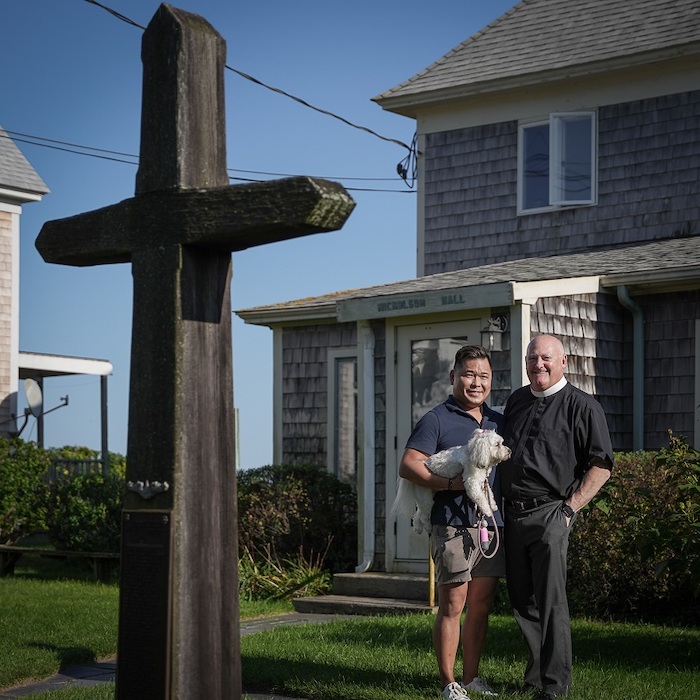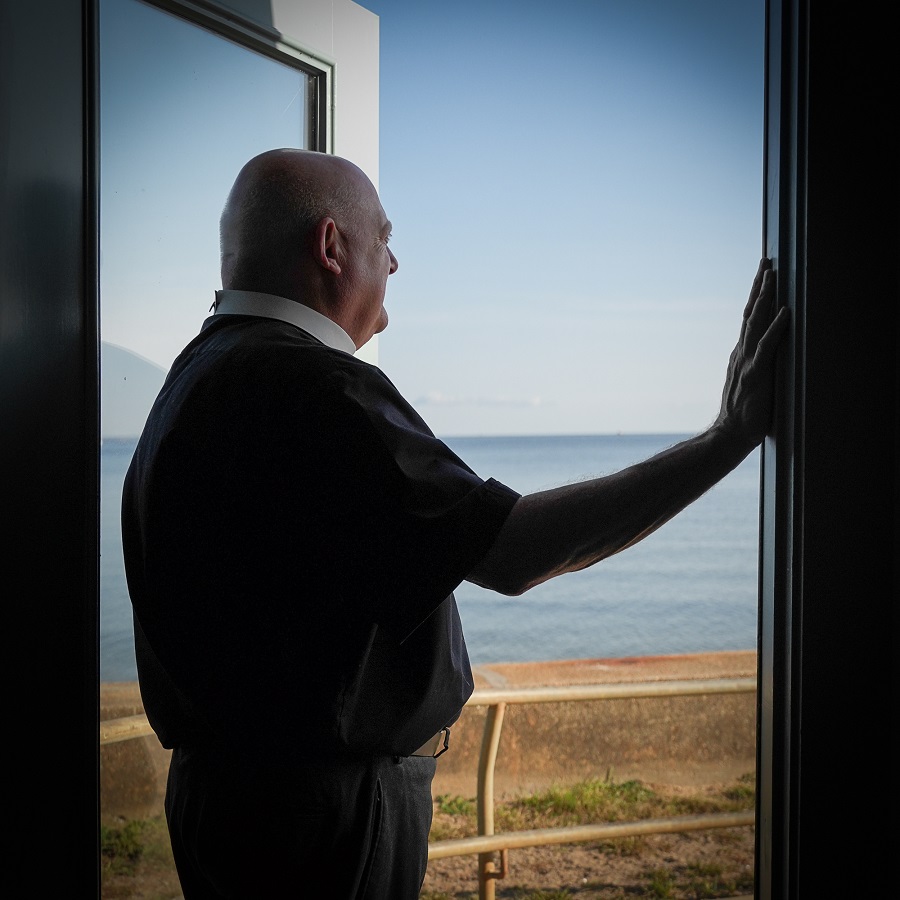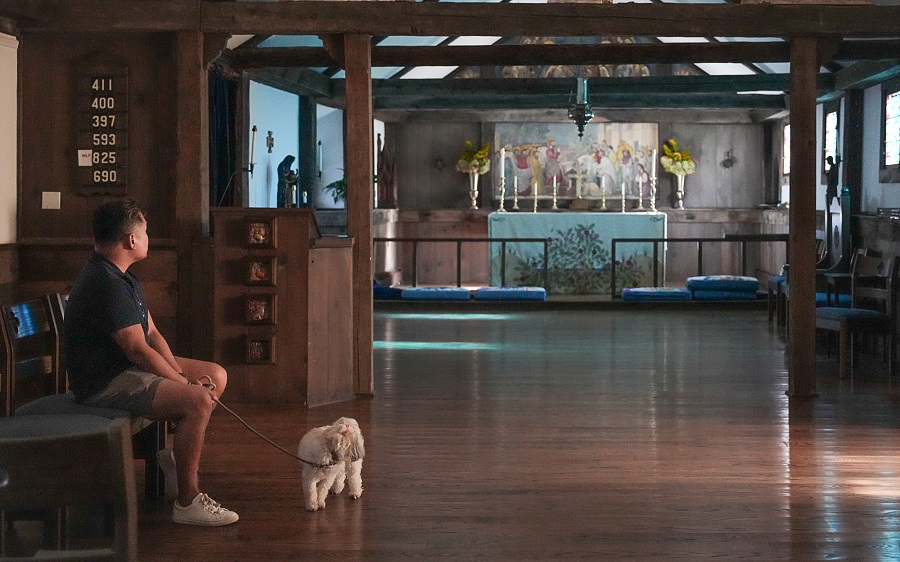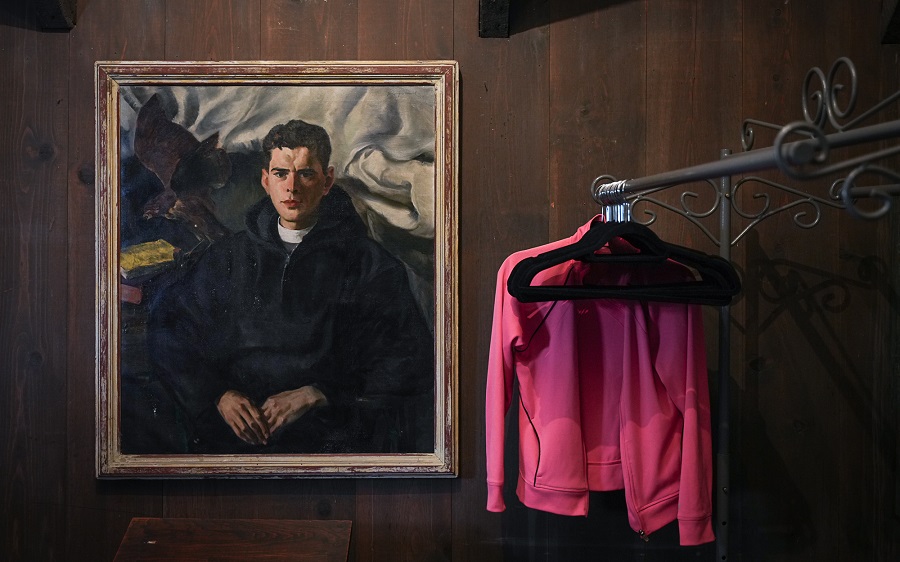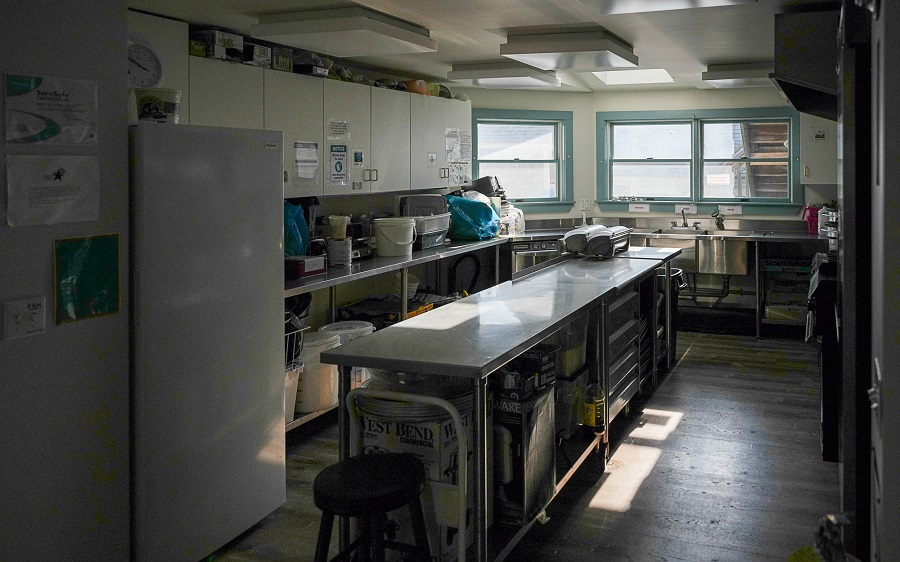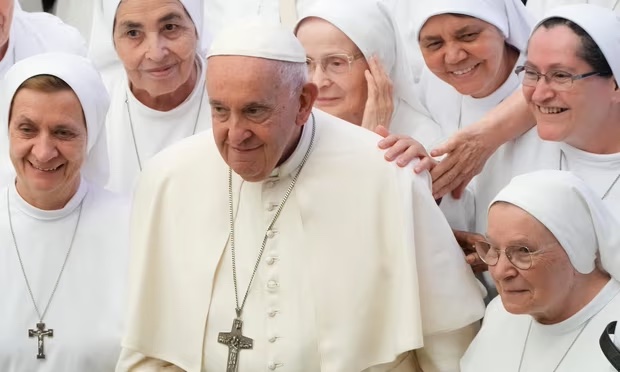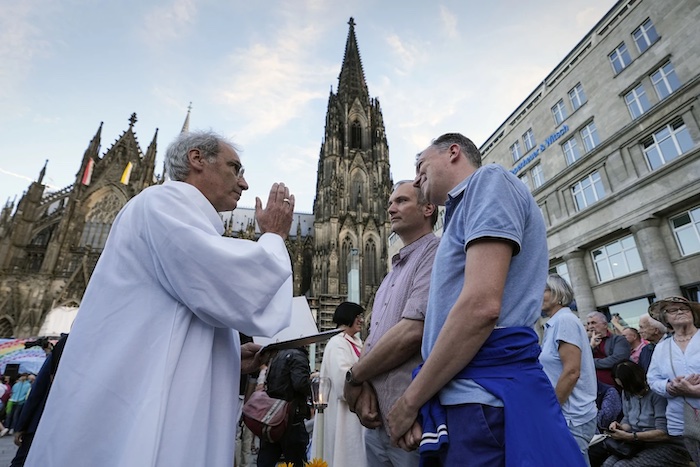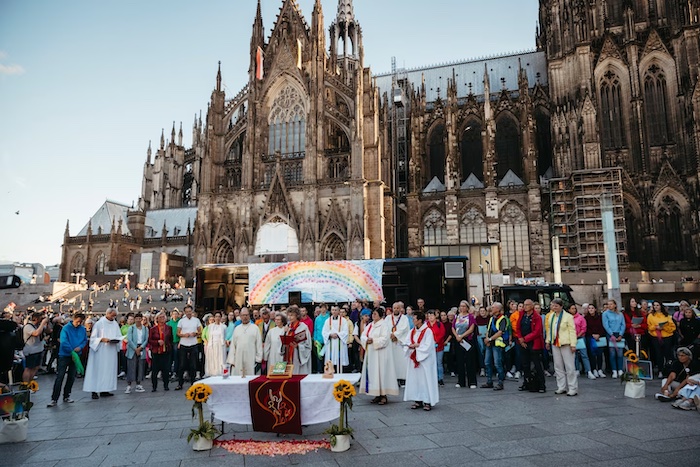
By Anthony Faiola, Michelle Boorstein & Kate Brady
In the shadow of Cologne’s Gothic cathedral, the St. Stephan’s Youth Choir struck up a chorus of “All You Need Is Love” as couples — men with men, women with women, and women with men — lined up to have their unions blessed by ordained Catholic priests wearing rainbow stoles.
It was an act of love — but also sedition, in direct defiance of the Vatican’s decree that same-sex unions should not be celebrated or recognized.
The German Catholic Church, long known for pushing the boundaries of the faith, has been translating frustrations among progressive Catholics in pockets throughout Europe into a veritable revolt. The question for 1.3 billion Catholics now is whether the German church is in flagrant disobedience — or showing a different path.
Pope Francis has reprimanded Germany’s Catholic leadership. He quipped to the head of its bishops’ conference last year that Germany already had one protestant church — “We don’t need two.” On Monday, however, the Vatican released a document that seemed to open a door to blessing same-sex unions and the study of female priests.
In the letter, dated Sept. 25, Francis wrote that there are “situations” that may not be “morally acceptable” but where a priest can assess, on a case-by-case basis, whether blessings may be given — as long as such blessings are kept separate from the sacrament of marriage.
“We cannot be judges who only deny, push back and exclude,” Francis wrote. “As such, pastoral prudence must adequately discern whether there are forms of blessing, requested by one or several people, that do not convey a wrong idea of a matrimony. Because when one seeks a blessing, one is requesting help from God.”

His words appeared to contradict a 2021 Vatican statement that confirmed a ban on blessing same-sex couples. Francis has also notably removed the conservative official said to be the architect of that decision and appointed a fellow Argentine who has seemed to take a different view.
Francis’s letter released Monday appeared to reveal less movement on the question of ordination for women. He wrote that Pope John Paul II had ruled against female priests and that the decision must be respected for now. But he also suggested the topic could be further researched.
Both the role of women in the church and blessings for same-sex couples, as well as the possibility of a married priesthood, are among the divisive topics on the agenda as Catholic leaders gather at the Vatican this week for the most sweeping summit on the direction of the faith since the Second Vatican Council in the 1960s.
Francis has already been facing a revolt on the right, with his most bitter conservative critics decrying him as a heretic. They have maligned the arcanely named Synod on Synodality — running from Wednesday through Oct. 29 — as a smokescreen for liberal reform.
Vatican watchers were not expecting big pronouncements, as the synod will convene again next fall and ultimately send recommendations to the pope then. And the Vatican has been playing down any notions of rapid reform.
But Francis has raised the hopes of progressives — and stoked the fears of traditionalists — that the church might, on some issues, begin to move in the direction of Germany.
German churches have been inviting women to say the homily at Mass and to baptize babies. Scores of German priests and monks have come out as celibate gay men, while some Catholic schools and churches have begun flying rainbow flags. A majority of German bishops have backed Catholic blessings of same-sex unions, calls for female deacons and the ordination of older, married men as priests.
“Many progressive Catholics look to the German church for a hopeful sense of where the church might be going,” said the Rev. James Martin, a U.S. delegate at the synod known for his ministry to LGBTQ+ Catholics. “But of course, just as many traditional Catholics look upon the German church with suspicion.”

At the Vatican, conservative fears and progressive hopes
The synod opening Wednesday — on the feast day of St. Francis — is not a political process, Vatican officials contend, but a chance for discussion, to “discern” God’s will for the direction of the church.
It requires that participants attempt to talk to each other — understanding that they represent an institution that encompasses German, Belgian and Swiss bishops who are already allowing blessings of same-sex couples, as well as American, African and Asian bishops who decry them.
The 364 voting delegates, observers say, include a relative balance of centrists, traditionalists and reformers, with some of the most extreme players on both sides left out.
But conservatives, including dozens of bishops from the United States, complain the synod is stacked against them.
They call its structure — which for the first time will allow laymen and women voting rights equal to cardinals and bishops — fundamentally un-Catholic. They see program documents asking for “concrete steps” to better welcome LGBTQ+ Catholics and people in polygamous marriages, among other categories, as dangerous.
Conservatives fear the synod process will open what they see as a Pandora’s box, eventually leading to unprecedented change on priestly celibacy, the acceptance of homosexuality and the elevation of women in a historically patriarchal church. They warn it could bring about a new schism, or split, in the world’s largest Christian faith.
Francis’s letter released Monday was written in response to a challenge, known as a dubia, issued by five conservative cardinals. They called on him to reinforce Catholic doctrine that condemns homosexuality and reserves ordination for “baptized males” only.
“The primary concern is that the pope will authorize things that are not contained in Catholic doctrine or that will contradict it — such as women deacons, blessing gay unions,” or weaken Catholic teachings against contraception and abortion by emphasizing individual conscience, said the Rev. Gerald Murray, a New York City priest who was not invited to the synod but will be in Rome doing commentary for conservative outlets.
“We’re not Protestants,” he said.
Predicting what the pope will do is much like reading tea leaves.
Francis raised the prospect of change early in his papacy, intoning “Who am I to judge?” when asked about gay Catholics. But he has been exceedingly cautious about altering doctrine. For instance, he has shied away from allowing married priests in the Amazon region, where extreme clerical shortages seemed to warrant it.
But as the 86-year-old pope looks to cement his legacy, much will depend on where he lands on these issues — whether he decides to urge the church closer to progressive positions. He faces the challenge of how to assuage liberal Europeans, in places where the church is rich but dying, without alienating fast-growing if more traditional churches in the developing world.

Going beyond talk in Germany
The Cologne Cathedral, where relics of the Three Kings are said to rest, is the largest Gothic church in Northern Europe. The writings of a rogue German priest named Martin Luther were publicly burned in its courtyard in 1520. Late last month, it served as the backdrop for a modern Catholic clash.
The Rev. Wolfgang Rothe, a wiry, openly gay German Catholic priest, organized the group blessing in reaction to a local cardinal, one of the few in Germany still disciplining priests for blessing same-sex couples. Rothe used the service as a rallying cry for the synod.
“I call on you, tell the pope, tell the synod of bishops, tell the world church: The current sexual morality of the Catholic Church is outdated,” he said. “It is unbiblical and immoral … a slap in the face of the loving God. This sexual morality belongs on the trash heap of church history.”
Nearby, a gaggle of conservative opponents prayed the rosary in protest. More radical elements on both sides — far-right Catholics and left-wing activists — jostled amid bullhorns and placards, and police intervened.
The Catholic Church in Germany is facing a crisis.
Measurable through a national church tax, German Catholics have been abandoning the church in record numbers — 522,000 last year alone. In a poll of those who had recently left the faith, the most common reason specified was the church’s handling of sexual abuse; the second its rejection of homosexuality.
Catholic bishops and laypeople in Germany sought to address that disaffection as they formulated their contribution to Francis’s synod, through a body called the Synodal Way.

Francis warned from the outset against a unilateral effort. “Every time the ecclesial community tried to get out of its problems alone, trusting and focusing exclusively on its strength or its methods, its intelligence, its will or prestige, it ended up increasing and perpetuating the evils it was trying to solve,” he wrote in a 2019 letter.
Nonetheless, by March of this year, Germany’s Synodal Way had proposed sweeping changes, including the ordination of female deacons and a reexamination of priestly celibacy in addition to same-sex blessings.
German bishops have mostly backed the proposals, while trying to buy time on some topics. They supported the ordination of female deacons, for instance, while conceding they first needed the permission of the Vatican.
But they have also grown more daring. In a country where the Catholic Church is the second-largest employer — with 800,000 workers, or six times more than Mercedes-Benz — German bishops amended the church’s labor law last year, so people can no longer be fired for being in a same-sex relationship or remarrying after divorce.


And in March, a majority of German bishops voted to allow blessings of same-sex couples — separate and distinct from the sacrament of marriage, but with standardized ceremonies to be drafted by 2026.
Liberal reforms have taken shape in other countries, too, but theologians see what Germany is doing as singular. They attribute it to a society that has emerged as one of the globe’s most socially progressive — and has a taste for rules.
“Some of these things happen in quieter ways in countries like Brazil,” said Massimo Faggioli, a Catholic theologian at Villanova University. “But the Germans are Germans, so they want formal recognition. That’s what’s different. They don’t want just de facto change. They want formal permission to change the books.”
The push within Germany matters all the more because the German Catholic Church ranks among the world’s richest — its dioceses are collectively far richer than the Vatican. And with this wealth, Germany helps to fund seminary schools and parishes across Latin America and Africa.

On a recent Sunday at St. Theodore’s Catholic Church on the edge of Cologne, Marianne Arndt’s white cassock billowed as she approached the pulpit to preach.
Arndt — a spiky-haired 60-year-old who said she had a calling from God as a young woman — has worked as a parish counselor here since 2016. She initially began offering a “final blessing” in lieu of last rites to dying patients at hospitals, using holy water instead of priestly oils. She began preaching during Catholic Masses years ago, but started describing her words as a “homily” in 2020, arguing that the time had come to “call it what it is.”<
Except that Catholic canon law requires an ordained deacon or priest to say the homily at Mass, and women can be neither.
The Rev. Dionysius Jahn, one of two parish priests who typically celebrate Mass alongside her, called her sermon an extension of religious teaching. He acknowledged the arrangement was atypical. “It’s very progressive here,” he said. “There are others that view [a woman in a role like this] very critically. They wouldn’t accept what’s going on here.”
It smarts, Arndt said, that she must metaphorically stand “behind” a male priest to deliver the homily, and she bristles against those who say she should leave the faith if she doesn’t abide by its rules.
“It is also my church, and I don’t run away,” she said.

Complete Article ↪HERE↩!

